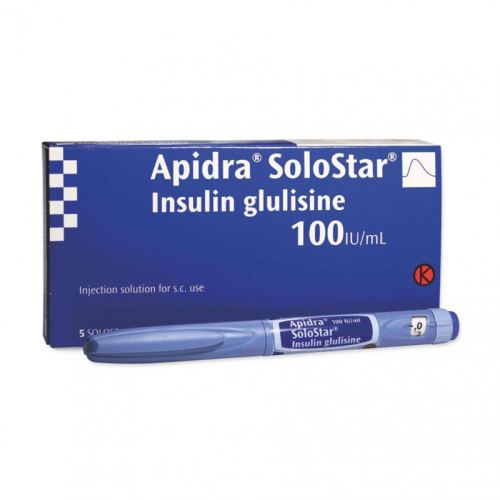CLASSIFICATION
Hormone and Synthetic Substitute / Antidiabetic Agent
ACNE
No
WATER RETENTION
No
HBR
No
HEPATOTOXICITY
No
AROMATIZATION
No
MANUFACTURER
Sanofi
WAREHOUSE
International Warehouse 2
SUBSTANCE
Insulin Glulisine
,
Insulin is a potent anabolic hormone essential for the proper functioning of all humans. While it is normally produced by the body, those with diabetes often require external insulin administration. Some athletes also use it to promote the development of lean muscle mass, but caution is warranted due to the potential for fatal consequences with misuse.
Although insulin has been naturally produced in humans for a long time, exogenous insulin became available in the 1920s. Initially, insulin was extracted from the pancreases of dogs, then later from cattle and pigs, despite concerns about purity. The lifesaving benefits of exogenous insulin were widely recognized, especially for those with diabetes, where lack of treatment could be fatal. Despite the impurities, the risks were deemed acceptable. By the 1970s, significant advancements had improved the purity of insulin, leading to the introduction of synthetic insulin by Ciba in 1975. In 1982, Humulin-R, a synthetic version identical to human insulin, was approved by the FDA.
Insulin Functions & Characteristics:Insulin, classified as a peptide hormone produced by the pancreas, plays a vital role in managing glucose, amino acids, and fatty acids. It prevents the metabolic breakdown of glycogen, fats, and proteins as well.
Diabetes patients may require insulin for two main types of the disease. Type I diabetes typically involves the body's inability to produce sufficient insulin, while Type II diabetes occurs when the body produces insulin but does not effectively utilize it, often linked to obesity.
As a peptide hormone, insulin stimulates the liver to convert glycogen into glucose, thereby inhibiting the conversion of non-carbohydrates into glucose. It also facilitates glucose diffusion into cells, promoting muscle tissue growth. Elevated insulin levels are associated with increased protein synthesis, enhanced bone density, and the production of Insulin-Like Growth Factor-1 (IGF), another potent anabolic hormone.
Beyond these roles, insulin has been shown to boost levels of Luteinizing Hormone (LH) and Follicle Stimulating Hormone (FSH), which may enhance testosterone production. While the impact on LH and FSH is not substantial, it is noteworthy.
Effects of Insulin:For those suffering from diabetes, insulin's primary effect is blood sugar regulation. Its strong anabolic and anti-catabolic properties can benefit athletes as well. However, exogenous insulin use by non-diabetics carries the risk of significant body fat accumulation and can be life-threatening if not used correctly.
Despite these risks, some athletes choose to use insulin due to its anabolic effects, but careful management of body fat is essential. High insulin levels can hinder the body’s ability to burn stored fat, so individuals must adhere to a carefully crafted diet. Monitoring calorie and fat intake is crucial to ensure nutrients are stored in muscle rather than fat stores. For optimal results, athletes often consider insulin administration immediately after intense weight training, paired with food intake.
Insulin can lead to substantial gains in lean muscle mass in a short time. Controlling body fat can be challenging, but it is achievable under the right conditions. Using anabolic steroids alongside insulin and Human Growth Hormone (HGH) is typically recommended in performance scenarios, promoting further growth and assisting in body fat management.
Side Effects of Insulin:Insulin use can have side effects, particularly concerning hypoglycemia, which can pose a risk in both diabetic and performance contexts. While manageable for diabetic patients with appropriate dosing, the risk is heightened in athletes using insulin for performance enhancement. Hypoglycemia, characterized by low blood sugar levels, can result in various symptoms including dizziness, hunger, drowsiness, blurred vision, and severe reactions that could lead to death.
Should hypoglycemic symptoms arise, immediate intake of fast-acting carbohydrates is vital—options like candy, sugary drinks, or juice are recommended. Furthermore, individuals should avoid sleeping immediately after insulin administration to prevent severe hypoglycemic events during sleep, which can be life-threatening. It is advised to never administer insulin alone and to have someone present for safety.
Severe hypoglycemia can occasionally lead to a diabetic coma and even death, making the condition a serious concern. Other potential side effects include allergic reactions at the injection site and localized fat storage, underscoring the importance of rotating injection sites to avoid excessive localized fat accumulation.
Insulin Administration:For diabetes management, the required insulin dosage varies greatly among individuals, with no standard dosage due to differing patient needs. In performance enhancement, various types of insulin exist, and the chosen form will dictate the overall approach.
Commonly, a standard performance-enhancing dose is about 1 unit of insulin per 10 pounds of body weight. Beginners are advised to start with lower doses, increasing gradually to identify a comfortable range. Symptoms of hypoglycemia indicate that the dosage may be too high, and many individuals may not tolerate the full estimated dosage.
The optimal time to take insulin is post-weight training, and one must consume significant carbohydrates immediately after the injection—at least 100g of carbohydrates should follow within 15 minutes, accompanied by around 40-50g of protein.
It’s crucial to keep fast-acting carbohydrates readily available in case hypoglycemic symptoms develop, and one should always avoid injecting insulin without these supplies close at hand. After the initial post-injection meal, planning for another meal soon is also recommended.
Insulin Reviews:Insulin plays a critical role in health and bodily function. While it can significantly aid muscle growth as a performance enhancer, the associated risks, including difficulty in controlling body fat and the potential for life-threatening situations, often overshadow its benefits. Most individuals seeking performance enhancements may find they do not need insulin and would fare better without it in the long run. Nevertheless, its popularity persists among some competitive bodybuilders and athletes, particularly those utilizing other performance-enhancing substances. However, the average individual using performance enhancers may struggle with fat gain when using exogenous insulin. Additionally, insulin's undetectable nature in drug testing makes it attractive to some athletes who may combine it with low doses of HGH and other medications to evade detection.

